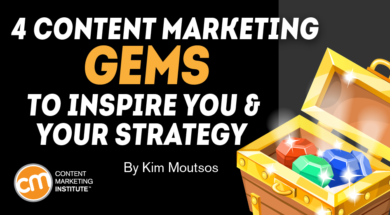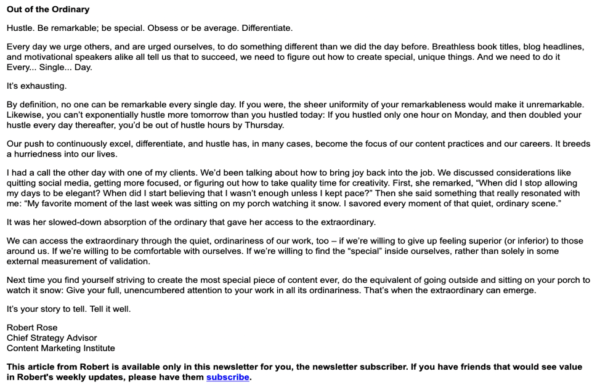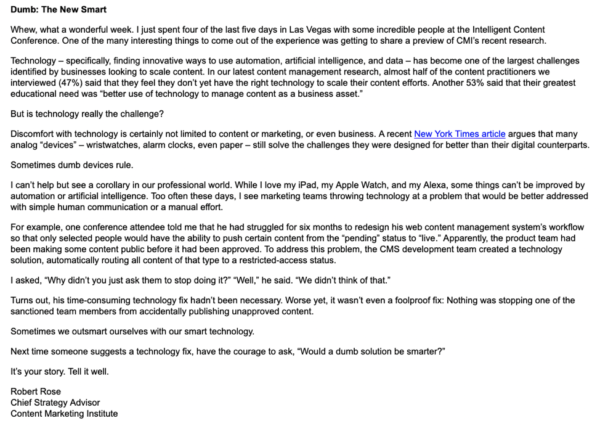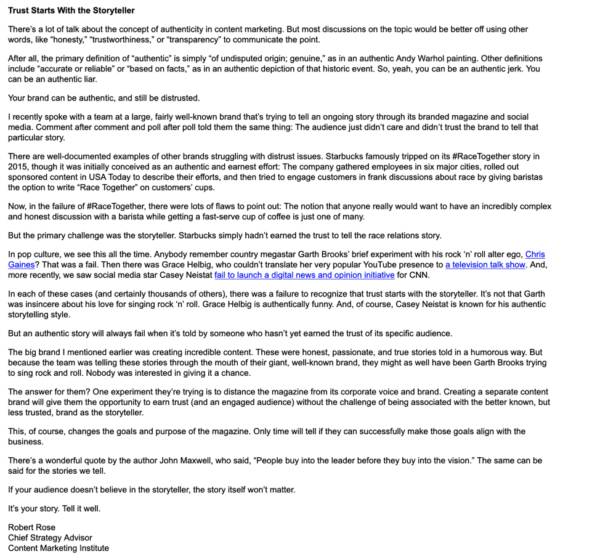
Every week, I have the privilege of editing a column from CMI Chief Strategy Advisor Robert Rose. Each one contains a gem of wisdom – sometimes more than one. Giving each a final polish is one of my favorite tasks.
That’s because Robert’s columns challenge me to think beyond how to do a content marketing task and even beyond how to do things better. Instead, he makes me think about why we content marketers do what we do and about the role of content, the job of content marketing, and what success really feels like.
Here are some of the lessons that resonated with me long after the newsletters hit people’s inboxes. (Robert’s column is only available in CMI’s Weekly Alert. If you’re not subscribed, you can sign up here.)
Slow your content roll
Robert jets around the world, speaking at conferences, teaching master classes, leading workshops, and, it seems, writing columns while 30,000 feet over a different continent or body of water every week.
Despite (or maybe because of) his own busyness, he gives the side-eye to the notion of “the hustle” – hurrying to get ahead, rushing to try something different because it’s new, and always striving to reach unprecedented heights:
“By definition, no one can be remarkable every single day. If you were, the sheer uniformity of your remarkableness would make it unremarkable. Likewise, you can’t exponentially hustle more tomorrow than you hustled today: If you hustled only one hour on Monday, and then doubled your hustle every day thereafter, you’d be out of hustle hours by Thursday.”
A conversation with one of Robert’s clients prompted his observations about stepping out of the race. While talking about how to return joy to her work, she made this confession: “My favorite moment of the last week was sitting on my porch watching it snow,” she said in Robert’s recounting. “I savored every moment of that quiet, ordinary scene.”
Where some might have encouraged the client to come up with a work-related moment of joy, Robert saw something different. “It was her slowed-down absorption of the ordinary that gave her access to the extraordinary,” he wrote.
And, in fact, he found a lesson for all content marketers in that simple moment of reflection.
“We can access the extraordinary through the quiet, ordinariness of our work, too – if we’re willing to give up feeling superior (or inferior) to those around us. If we’re willing to be comfortable with ourselves. If we’re willing to find the ‘special’ inside ourselves, rather than solely in some external measurement of validation.”
When you find yourself daunted by the push to be remarkable all the time, try Robert’s suggestion:
“… do the equivalent of going outside and sitting on your porch to watch it snow: Give your full, unencumbered attention to your work in all its ordinariness. That’s when the extraordinary can emerge.”
Appreciate the ordinary so the extraordinary can emerge, says @Robert_Rose Click To Tweet
When it comes to content and technology, simple is smart
In the drive to automate everything. Robert says, we run the risk of unnecessarily complicating both our lives and our work.
In the drive to automate everything, we risk unnecessarily complicating things, says @Robert_Rose Click To Tweet
For examples from everyday life, he pointed to a New York Times article that listed analog products – like wristwatches, alarm clocks, and paper – that can outperform their digital equivalents.
For an example from the content world, he relayed the story of a conversation with a conference attendee. The man had spent months trying to redesign his content management system’s workflow so only certain people could push content live. The new tech solution would, he hoped, prevent the product team from publishing content before it was approved.
But when Robert suggested the attendee simply ask the team to stop publishing unapproved content, the conference-goer admitted he hadn’t thought of that simple approach.
Robert’s take?
“Sometimes we outsmart ourselves with our smart technology”
To be believed, you must earn your stories
“Your brand can be authentic, and still be distrusted.” That truth bomb grew from Robert’s work with a team at a large, well-known brand. The brand’s content team had found the audience didn’t trust the brand’s efforts to tell stories through its magazine and social channels.
It’s a struggle many brands (and people) face.
Robert brought up the “brew”-haha that arose when Starbucks introduced its #RaceTogether initiative in 2015. However well-intentioned, the decision to have baristas write “Race Together” on cups to encourage discussions about race just didn’t work. Starbucks simply hadn’t earned its audience’s trust on race relations.
People and brands who are trusted for one thing (coffee, for example) find they’re not automatically trusted for other things, Robert explained. To underscore the point, he gave examples of storytellers known for their authenticity who nevertheless struggled to earn an audience when they switched genres or formats. Think Garth Brooks’ alter ego Chris Gaines or YouTube star Casey Neistat’s failed digital news and opinion initiative for CNN.
A brand trusted for one thing is not automatically trusted for another, says @Robert_Rose Click To Tweet
The reason they struggled, Robert wrote, comes down to this:
“If your audience doesn’t believe in the storyteller, the story itself won’t matter.”
You Must Win Every Moment of Trust to Win the Moment of Truth
For better content, hit the eject button
In mid-2018, Robert traveled to South Korea to teach a content marketing master class. To prepare, he researched the differences in content marketing approaches, attitudes, and channels in Asia compared with Europe and North America.
Looking at his familiar presentation material with an eye toward a new audience stirred “lots of new ideas for the way we can demonstrate value with content marketing.” And those new ideas weren’t limited to the class in Korea. Instead, they stretched to other CMI classes, Robert’s consulting, story ideas, and more.
The change in perspective proved so inspiring, Robert suggested we all try it.
Change your perspective to inspire freshness in your editorial strategies, @Robert_Rose Click To Tweet
Of course, you might work in the same location day after day. But that doesn’t mean you can’t experience the benefits of a perspective shift. Robert offered suggestions for activities that might show your editorial strategies in a new light:
- Read magazines and journals from other industries.
- Review the history of content marketing to look for repeating patterns.
- Test your story with people who know nothing about your business.
The key, Robert wrote, is to find new stories in the different.
“Let’s occasionally and purposely eject ourselves from our regular patterns and set down among the completely unfamiliar. We might be surprised at how good the stories we find there really are.”
What moves you?
Do you have a favorite Robert Rose column? Maybe it’s the one about the purple duck. Or the one about the blue stripe. Or one that helped you and your team think about your content differently than before. I’d love to hear which ones stood out to you. Let me know in the comments.
Make sure you receive Robert Rose’s weekly gems of wisdom – subscribe to the Friday newsletter today.
Cover image by Joseph Kalinowski/Content Marketing Institute



